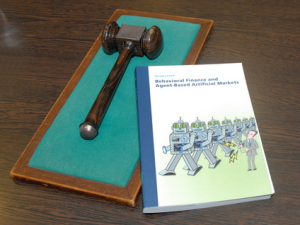PhD Thesis Defense Milan Lovric on Behavioral Finance and Agent-Based Artificial Markets
On March 25, Milan Lovric defended his thesis entitled "Behavioral Finance and Agent-Based Artificial Markets". His promotors are Prof. dr. J. Spronk, Academic Dean MBA Programmes and Professor of Financial Management Science, Rotterdam School of Management, Erasmus University Rotterdam, and Prof. dr. ir. Uzay Kaymak, Professor in Intelligence and Computation in Economics, Erasmus School of Economics, Erasmus University Rotterdam. Other members of the Doctoral Committee are Prof. dr. M.J.C.M. Verbeek, Prof dr. D.J.C. van Dijk, and Prof. dr. S. Solomon.
In his dissertation, Milan Lovric analyzes market-wise implications of investor behavior and their irrationalities by means of agent-based simulations of financial markets. The usefulness of agent-based artificial markets for studying the behavioral finance topics stems from their ability to relate the micro-level behavior of individual market participants (represented as agents) and the macro-level behavior of the market (artificial time-series).
Lovric studies various biases commented in the behavioral finance literature and proposes novel models for some of the behavioral phenomena. Furthermore, mathematical definitions and computational implementations for overconfidence (miscalibration and better-than-average effect), investor sentiment (optimism and pessimism), biased self-attribution, loss aversion, and recency and primacy effects are provided. The levels of these behavioral biases are related to the features of the market dynamics, such as the bubbles and crashes, and the excess volatility of the market price.
This thesis has confirmed the added value of agent-based financial market models in studying the topics of behavioral finance, which stems from their ability to relate the micro-level behavior of individual market participants and the macro behavior of the financial markets, as well as the consequences of such macro behavior, such as investor performance. This micro-macro mapping of agent-based methodology is particularly useful for behavioral finance, since that link is difficult to establish when using different (e.g. empirical) methodological approaches.
About Milan Lovric

Milan Lovric and paranymphs
Milan Lovric was born on October 17, 1980 in Zagreb, Croatia. He studied computer science at University of Zagreb, Faculty of Electrical Engineering and Computing (FER), from which he obtained his degree of a graduate engineer of Computing (MSc) in 2005. The same year he also obtained a Diploma Study in Management postgraduate certificate from University of Zagreb, FER. In 2006 Milan joined Erasmus University Rotterdam, Erasmus School of Economics as an ERIM PhD Candidate in the area of finance. He worked with the Finance section of the Business Economics department until 2010, when he joined the Econometrics department. During his PhD project, Milan was involved in a number of courses at Erasmus School of Economics and Rotterdam School of Management, as a lecturer, a teaching assistant or a practical coordinator. He has presented his work at a number of international conferences and meetings, and part of his work has been published in Human Systems Management journal and as a book chapter in Advances in Cognitive Systems. His research interests include agent-based modeling, artificial financial markets and behavioral finance. Milan is currently pursuing a postdoctoral research at Rotterdam School of Management, the Department of Decision and Information Sciences.
Abstract
Studying the behavior of market participants is important due to its potential impact on asset prices and the dynamics of financial markets. The idea of individual investors who are prone to biases in judgment and who use various heuristics, which might lead to anomalies on the market level, has been explored within the field of behavioral finance.

PhD thesis
In his dissertation, Lovric analyzes market-wise implications of investor behavior and their irrationalities by means of agent-based simulations of financial markets. The usefulness of agent-based artificial markets for studying the behavioral finance topics stems from their ability to relate the micro-level behavior of individual market participants (represented as agents) and the macro-level behavior of the market (artificial time-series). This micro-macro mapping of agent-based methodology is particularly useful for behavioral finance, because that link is often broken when using other methodological approaches. In this thesis, Lovric studies various biases commented in the behavioral finance literature and proposes novel models for some of the behavioral phenomena. Mathematical definitions and computational implementations for overconfidence (miscalibration and better-than-average effect), investor sentiment (optimism and pessimism), biased self-attribution, loss aversion, and recency and primacy effects are provided. The levels of these behavioral biases are related to the features of the market dynamics, such as the bubbles and crashes, and the excess volatility of the market price. The impact of behavioral biases on investor performance is also studied.
More information
Pictures of the defense
Full text of the dissertation

